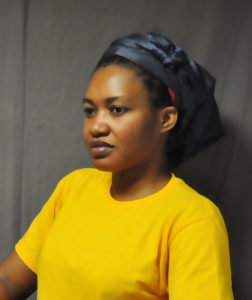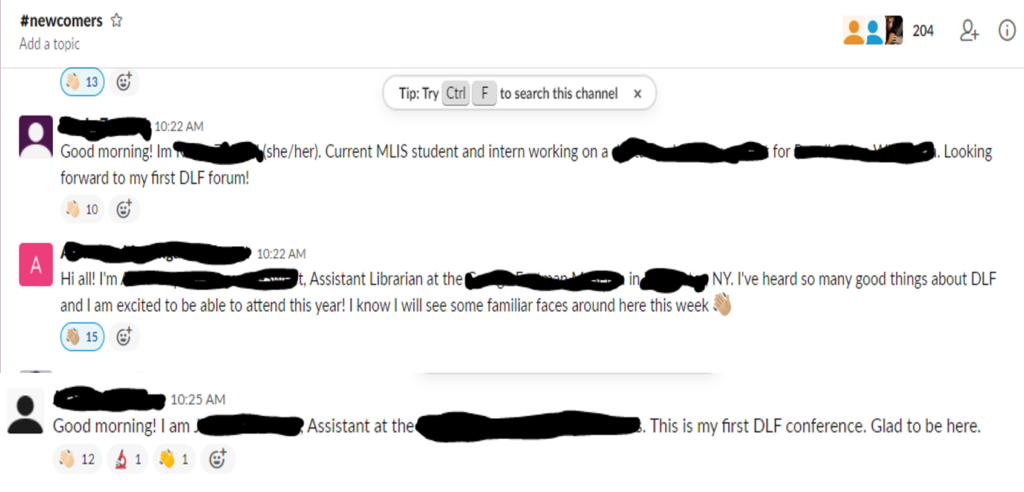 This post was written by Rebecca Bayeck (@rybayeck), who was selected to be one of this year’s virtual DLF Forum Community Journalists.
This post was written by Rebecca Bayeck (@rybayeck), who was selected to be one of this year’s virtual DLF Forum Community Journalists.
Rebecca Y. Bayeck is a dual-PhD holder in Learning Design & Technology and Comparative & International Education from the Pennsylvania State University. Currently a CLIR postdoctoral fellow at the Schomburg Center for Research in Black Culture where she engages in digital research, data curation, and inclusive design. Her interdisciplinary research is at the interface of several fields including the learning sciences, literacy studies, and game studies. At this intersection, she explores literacies and learning in games, particularly board games, the interaction of culture, space, and context on design, learning, research, literacies.
The year 2020 is, without a doubt, complex, filled with multiple challenges as well as opportunities. From remote working/online learning environments to conferencing in a virtual space, everyone has tried and is still trying to adjust to the “new normal” or maybe “new abnormal”. Among those adjusting to the world of social distancing is the Digital Library Federation (DLF) Forum. The 2020 DLF Forum was my first introduction to and participation in the work completed by this community of librarians and library enthusiasts.
The 2020 DLF Forum was in a virtual format. Though I would have loved to visit Baltimore, interact in-person with my CLIR cohort, and experience the food culture of Baltimore restaurants, the virtual space still provided a space for encounters and meaningful interactions. The conference organizers used two platforms: Aviary for pre-recorded presentation viewing and Slack for questions and dialogue with attendees. Both platforms created a unique and complimentary online experience. For instance, each video had captions and a downloadable transcript, making the content more accessible. Slack discussions created a sense of community, and gave me a sense of belonging through the interaction among participants. It was a common practice for participants through emojis to like, applaud, or reply to a post/comment (Figure 1).

Slack’s direct message option further personalized my experience of the online conference. I directly exchanged with some attendees, and established personal rapport. However, my major takeaway from the 2020 DLF Forum was inclusion, shown in the accessibility efforts deployed by the organizers, and in the diversity of topics covered by presenters. The conference brought to the forefront research/topics that have received less attention in the past, and should be discussed today across disciplines and fields.
Stacy Reardon and Michael Lange from UC Berkeley presentation on Can We Digitize This? Should We? Navigating Ethics, Law, and Policy in Bringing Collections to Digital Life was so inspiring. In my view, it captured the essence of digitization and how it should be done. It is important for individuals engaged in digitization efforts to always ask whether “the value to cultural communities, researchers, or the public outweighs the potential for harm or exploitation of the people, resources, or knowledge.” It is about not harming or causing harm to the various stakeholders who will see or engage with our final product. This balancing principle can be applied to any research, design, development, or digitization endeavors. Paraphrasing Stacey Patton, 2020 DLF Forum plenary keynote speaker, “how the knowledge came about, [who it will harm, and who will claim ownership of it] is as important as the knowledge itself.” Juliet Hardesty from Indiana University’s presentation on Mitigating Bias Through Controlled Vocabularies gave a powerful insight into why it is important to incorporate community vocabulary to broaden access to knowledge/data, and fight biases.
Being a panelist in the session Creating accessible and inclusive content and presenting on Addressing Issues of Accessibility: Urgency in a World of Social Distancing, added to my experience. My interest in issues of accessibility for blind/low vision, deaf/hard of hearing individuals in this era of social distancing facilitated conversation with other session presenters on the accessibility of this conference for screen reader users. From our conversation, it became obvious that the organizers needed to be commended for providing scripts and captions for the recorded videos. Dee, who is blind and uses a screen reader to access contents, and Micky, who is sighted, but did use a screen reader said about their experiences:
Dee: I do appreciate knowing that there is a caption and there is like, the scripts and everything. It does make you feel more welcome and it does make you realize yes, they’re making an effort. Applause should be given for, you know, for the effort and definitely you know even the fact there is like, an accessibility session or stream, that’s important.
Micky: But if I could say one thing is, I think, I know people were making efforts into making it accessible. I think applause is very much deserved. and I think keep, we got to keep trying and we gotta keep finding innovative ways of working together and collaborating. So I would want people to feel encouraged that there’s more work to be done. But let’s pursue it as a team and then pursue it together because it’s worth it.
Nevertheless, Dee and Micky did have some suggestions for creating accessible conference experiences:
Dee: The first thing I may say would be to include in the planning committee. Kind of representation from all the groups that you would like to have at the conference, because they will help think about, in this case, about screen readers and which tool and will it be interactive and you know if we want to make it interactive, is there an option or how can we? You know, it’s necessary for someone to think about those things…ensure to have broad representation in the planning committee, or if not in the planning committee, make a point to reach out and consult. So, engage with people with lived experience of whatever the conference you know is trying to accomplish.
Micky: If I could make a suggestion that might just be to have a panel with like, just in this particular case, disabled leaders in the GLAM field. you know there’s, I’m sure, a ton out there that would love to have a platform to share from the perspectives of making libraries you know, gallery’s archives, museums, accessible. Maybe, it’s inviting the leaders to come and present to the whole Forum.
These suggestions for future conferences are so important because Dee and Micky had difficulties using their screen readers with Slack and Aviary. For instance, Dee, on the day of the panel, felt she cheated by relying on Micky and “by accessing the videos directly from the Google Drive not in Aviary because then I had to figure out where the play button was and like the website was a bit clunky with JAWS”. Having Slack and Aviary added:
more things you need to interact with and like, I think we know that Slack is accessible, like it works with screen readers, because we could make it work, but really the extra time that you need to put into learning how to use it and use it effectively (Dee).
Regarding Slack, Micky said:
practice beforehand, which I think is helpful. If it was simpler that you could reduce that amount of time it takes to, that’s required to familiarize oneself…And then when it’s active, there’s another layer of complexity of information overload too. Because of all that activity, I think it just took me a long time. I wonder how long it would take someone who didn’t have, you know, that was pursuing this independently.
Attending the DLF Forum was inspiring not only in terms of the topics addressed, but also in the opportunity it created for me to gain insights into the conference experience of screen reader users. It is critical in the era of online conferences to take into consideration the experiences of these attendees in the choice of conference platforms. Much more can be said, and I believe it is important to not only design/plan for, but also design/plan with individuals with lived experiences (e.g., screen reader users, blind/low vision, deaf/hard of hearing, or individuals with cognitive abilities).
